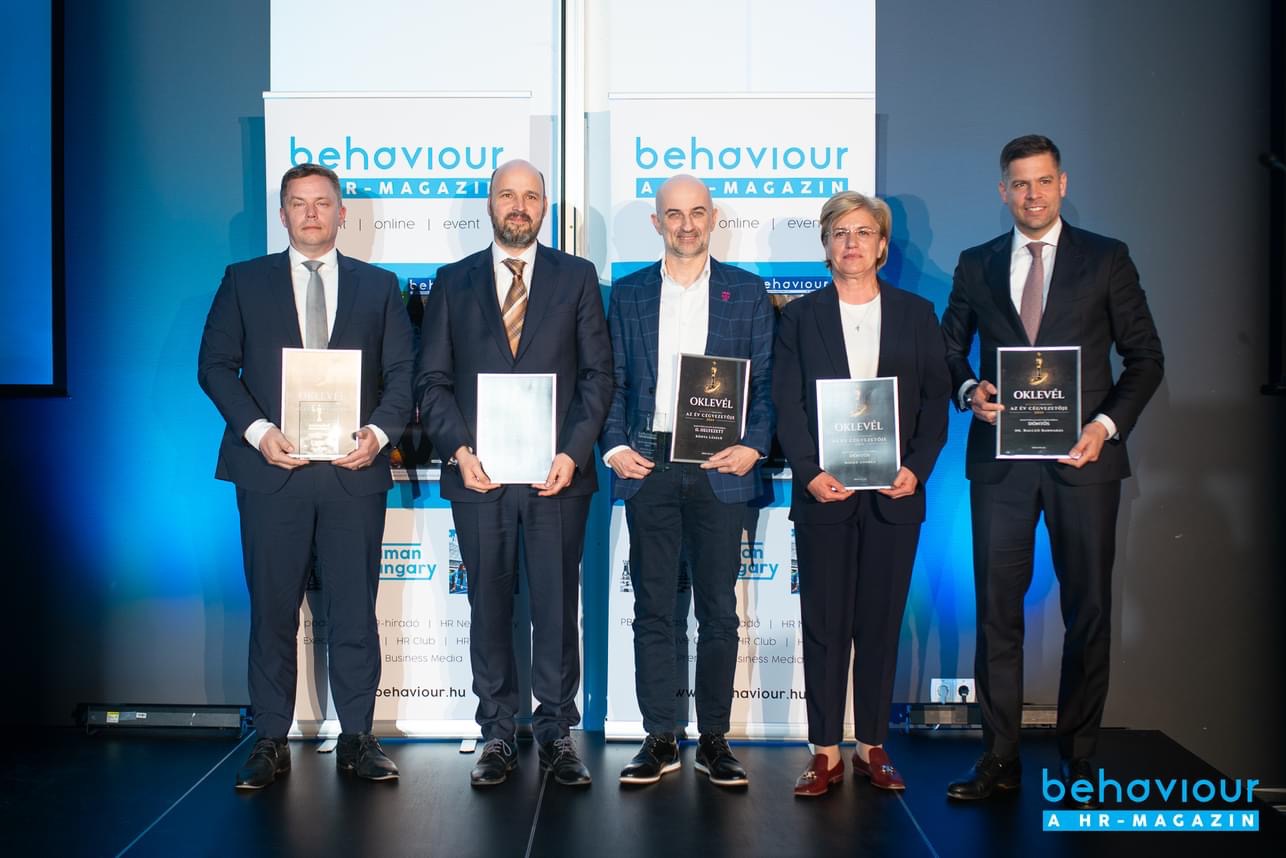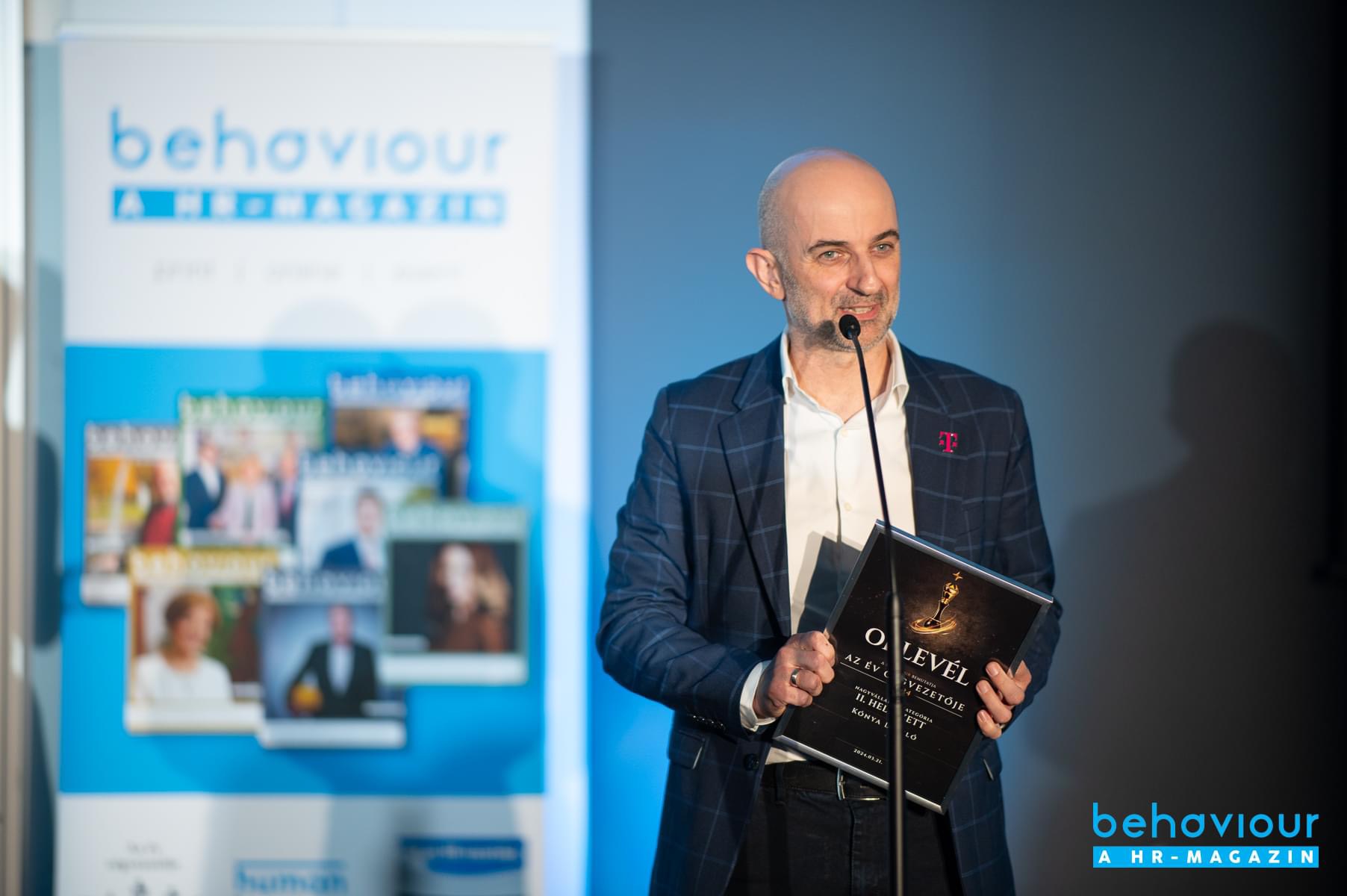“It’s not my award, it’s the team’s award” – interview with László Kónya
For the fourth time, Behaviour magazine has launched its ‘CEO of the Year’ competition, looking for small, medium, and large business leaders whose outstanding achievements go beyond individual success. Our Managing Director, László Kónya won second place in the large company category. – Interview
You’ve been the company’s CEO for two years but have been working at DT-ITS Hungary for 14 years. During this time, you have been part of the company’s dynamic growth, working alongside four other managers. Was it an advantage or a disadvantage to come from within with such a long track record to the position of managing director?
It’s an advantage and a disadvantage, both at the same time. On the one hand, the advantage was that I knew what I was taking on. The last three managers had come from outside, from companies in the market, so they didn’t necessarily understand what it meant to run such an internal service centre. I had no illusions, if not misconceptions, about what this company was, how it worked. DT-ITS operates on a more constrained track than a market company. This has its downsides, but if you are aware of them, you can maximize the entire experience. The disadvantage of internal progression is actually independent of position: when you grow out of a team into a leader, it’s always a question of how the team accepts you. There’s always a bit of a sizzle there. I had an external “help” in this initial period, as I started on 1 February, and then on 22 February the war erupted, and everything turned upside down around us. This had a very negative impact on the world, both humanly and economically, but from then on, the whole team had to stick together, and it was not a question of whether I had just been appointed or whether I was fit to be CEO, but we had to work together as a team straight away.

You mentioned unity and cooperation. How would you describe the leadership culture in DT-ITS Hungary today? What do you think is one area where you might need to improve?
I must say we are in a fortunate position. I have been here for 14 years and in those 14 years DT and with it DT-ITS Hungary have come a long way in terms of leadership culture and people management. Pretty much the same concept has emerged in all areas, somewhere it is called outward mindset, somewhere it is called servant leadership, but pretty much all areas – in Germany too – have started to work hard on how a leader can become a supportive leader and not a demanding leader. After all, in a dynamically changing, often chaotic world, things are spinning up and in the midst of the spin you can no longer centrally solve everything. The economic, political, and technological environment is also changing so rapidly, it’s essential to have empowerment at the team level. Therefore, you need a company culture that does that. Is that how we are already operating? We are moving towards that goal. The difficulty is always that when there is a lot of pressure in one area – and now all our areas have to meet high financial expectations –, it also brings up old habits, because not everything can be solved democratically. The point is that we have to find a healthy balance. Furthermore, I think it’s very important that as role models we expect more from our leaders – including myself, ourselves at Excom, whether it’s about office presence or switching to an electric car, just to name a few examples. This is perhaps one of the most challenging parts of the job, and it is an area where we have room for improvement.
Do you see yourself more as a leader or a team member?
As a team member. I don’t really like working alone. At the beginning of my career, I was programming, I did some end-to-end tasks, but I soon realised that I like it much better and it works better when you work with people. Everybody has their strengths, and my strengths are more in how to work with others to find the optimal setup, functionality, and how to get the most out of a team. Besides that, I obviously have my own weaknesses and I need people around me to help me overcome those too.
In your application, you also stressed the importance you attach to the relationship between people and technology. What do you mean by this?
Technology should help us as a technology company to make the world a better place. What we can see is that the world is not going in the right direction in many ways, whether you look at it from an economic, political or war perspective. We have reached a point in history where we are in a trough again. We ought to be taking it in a better direction with technology, and I fear that is not what is happening if we do not pay attention to the ethical aspects. Artificial intelligence is the fastest developing field now, and there is a great danger if we do not train human society in how to make it work properly. Just think of the social media platforms that emerged 10-15 years ago and their negative social impact, whereas that was a much slower process.

The CEO of the Year competition consisted of two rounds, the first being the public vote itself, where you received the second highest number of votes in the large company category. Did you expect such a high level of support?
I did not know about the whole nomination. I got a call from the newspaper saying they were happy for me to participate and to send me the materials. And I asked them what it was. So did I, and presumably most of the leaders were nominated without even knowing it. I didn’t have any expectations, I thought if I made the shortlist, that was good, as there were ten of us in a cross-industry competition. I’d never been to a competition like this before, but it was very exciting to see all the hustle and bustle around the nomination process.
What do you think were the factors that led the jury to award you second place?
The application we submitted was not about me, it was about the company. I don’t think that I’m doing anything special personally, but we have a very good team working together, surrounded by some truly inspiring people. As you move up the ladder, you can deal less and less with individual problems, because you have too many people in your organization, but you become interested in how you can have a positive impact on a larger population. You realise that your life is not just about running a successful company, having four daughters, and going for a run, but that as a leader you can add something extra to life. For instance, it’s not my credit that we teach disadvantaged children in Szendrőlád and Pécs, but going there is always a fantastic experience. In the meantime, we are signed up to the Edison platform, where we work with a lot of foundations, and I’m in the leadership circle of Bridge Budapest. Somehow over the years a lot of inspiring people have helped guide me on this journey, which gives me a lot of positivity back.
You mentioned earlier that you see yourself as an absolute team player. Who contributed to this recognition?
It’s not my award, it’s the team’s award. The full Excom: Évi, Zsolt, Bea, Örs, Steve, Peti and Móni. We practically do the whole story as a team. I’ve just picked out the Excom, but there are so many colleagues besides everyone that I could list endlessly. And of course, my partner, she is the one who motivates me every day and challenges me daily. The funniest thing is that when I give a speech – which I love to do anyway –, I practice it at home. Usually, I get constructive criticism on the first version, which of course is not very pleasant. But after I get my act together and listen to my partner’s opinion, after two or three tries, it turns out much better. I think the worst thing is when a leader is sitting in the ivory tower and everyone around him is giving him or her positive feedback. It is important for me to be surrounded by people who dare to say that what I am doing is wrong. And it’s not just the Excom, but even Anna who supports me every day. I’m surrounded by people like that. It may not feel good at first, but it often turns into a good discussion, and it’s the little things that help me become a better leader.
To conclude, I would like to thank everyone in the company who wants to do something for our common future. This award, alongside many other company awards, is an important feedback from the market that we are moving in the right direction. I can promise that we will not just sit back but will continue to work to be a better company, to provide the highest quality service to our customers and to give our colleagues long-term career and personal development opportunities, despite the complex environmental challenges.